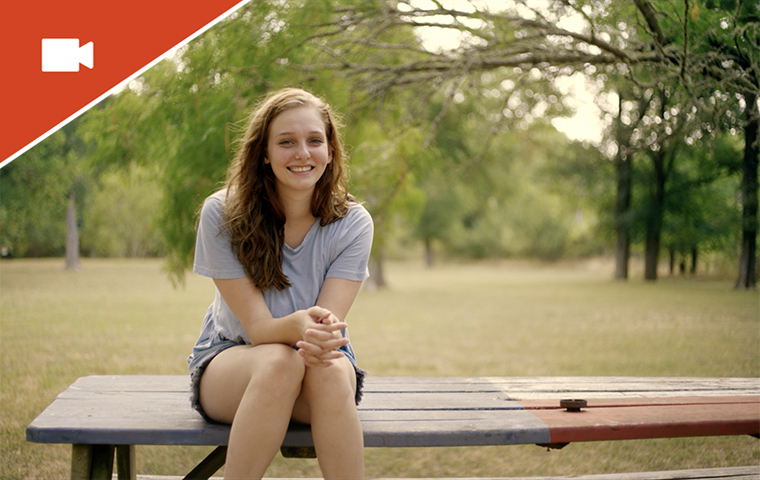When First Sargent Geraldo Rivera and his family received a transfer to San Antonio, the transition was hardest on his young children—Gabriel, age 4, and Geraldo Jr. age 5. “Moving was something we were super used to,” says mom Kayla Rivera. “The military does a good job of preparing the service person, but we were having a lot of difficulty with Geraldo Jr. in daycare, because he had always been with the same people. I was getting multiple messages and calls a day from the school about his behavior, and I was like, I need some outside input and help.”
Services for Services Members
At a military fundraiser, Kayla heard about resources available for service people through the Service Members, Veterans, and Families (SMVF) program. SMVF provides support for families when a parent is serving or has served in the armed forces, reserves, or National Guard. Parents can access parenting classes, educational resources, counseling, and other support services. The program helps parents find ways to support their child's emotional and physical well-being. It also gives parents a place to build friendships and make connections to expand their support system.

Ms. Jackson helps military families deal with transitions, big and small.
Military Families Helping Each Other
The Rivera family started with a group class specifically designed for military families undergoing a PCS (Permanent Change of Station) or other big transition. It was there that they got to know Denise Jackson, a parent educator with Family Services. “My husband was deployed when I met them,” Ms. Jackson says. “I think that gave me a greater insight for knowing what they go through, so we connected and bonded really fast with each other.”
Programs Designed for Parents
When the Riveras found out about the Triple P parenting program that Ms. Jackson led, they signed up. “Triple P stand for Positive Parenting Program,” Ms. Jackson says. “In our curriculum, it’s more about digging deeper into self and then looking to see if some of the things I do is why my child does them and changing those routines.” The program also helped Kayla and Geraldo examine their own parenting styles and where they came from. “We definitely have different parenting styles,” Kayla says. “He’s kind of more of the ‘Okay, suck it up type,’ and I’m more of the ‘Okay, everything will be all right, let’s talk about it,’ type.”
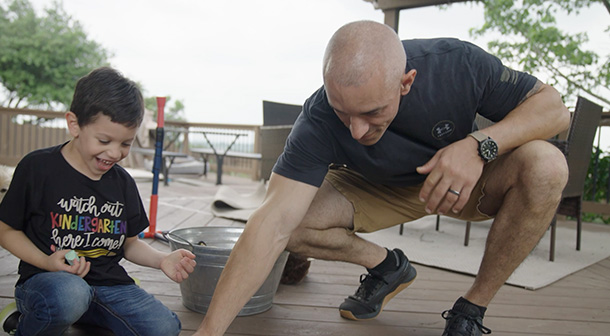
Geraldo and his son enjoy simple moments together.
Getting on the Same Page
The program covers topics that range from dealing with temper tantrums and planning activities to examining family patterns. “There were certain things that I could see myself doing that I didn’t like,” Kayla says, “so going through the Triple P Program put us on the same page. It helped align the way we parent.” Both Kayla and Geraldo knew they didn’t want to repeat the all the patterns they had experienced in their own childhoods. “Coming from the background I did, if I did something bad, I got punished for it,” Geraldo says. “I knew if I had a family, I wasn’t going to do it like that, I was going to try to change it a bit.”
Explore programs in your area to help with parenting skills, crisis intervention, home visiting programs, community and school-based mentoring, and more.
A Change for the Better
Geraldo and Kayla can already see the program making a positive difference in their own interactions with their children. “Before we started the classes, there were certain things that I could see myself doing that reminded me of things my parents did when I was a child that I didn't like,” she says. “And so being able to nip that in the bud with this parenting program has been really good, because I can see it affecting them. For example, if a glass breaks, my initial reaction might be, ‘Oh my gosh, why did that just happen?’ Instead, now I might be like, ‘Okay, well, let's just pick it up,’ and have a calmer reaction. If we model good parenting for them, then they're going to have that in the future.”
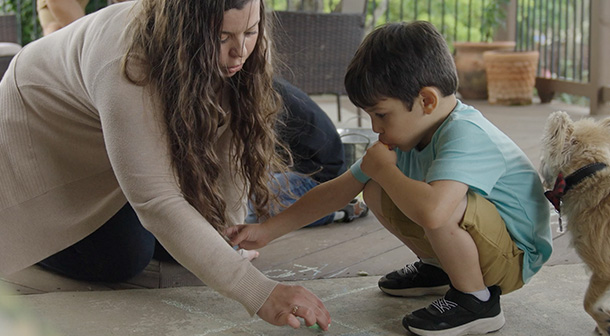
Kayla and her sons have fun drawing with chalk and hanging out.
Proactive Parenting
As Geraldo and Kayla’s routines began to change, so did Geraldo Jr.’s. “I see a 100% difference in him,” Kayla says. “When he first started the program, he had a really difficult time processing his emotions. Ms. Jackson taught us to be proactive about things, to prepare him and to allow him to know, okay, like if this happens, this is what I’m going to do. I’m not going to overreact. He was able to stop and think about what he’s going to do or say first. And manners and things—she’s really big on that. You have to say ‘Excuse me’ if you’re going to interrupt. And so, the teachers understand him a little bit better because he’s able to articulate how he’s feeling and what he’s thinking.”
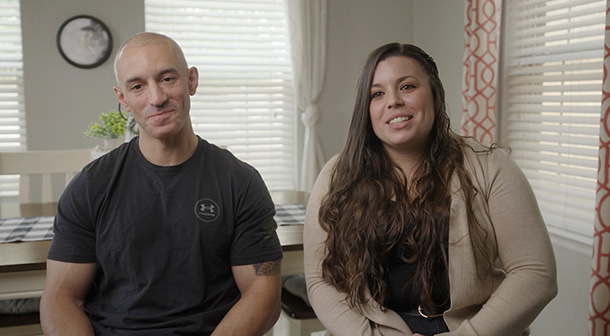
Kayla shares that SMVF has helped them as parents and their marriage.
Stronger Parents, Stronger Marriage
Being on the same parenting team and having a solid strategy in place has helped Geraldo and Kayla’s marriage. “Getting on the same page with the parenting technique was very helpful in our marriage because we didn’t necessarily disagree,” Kayla says. “We have already agreed this is how we’re going to parent, so when something happens, it isn’t a discussion anymore. And with the behaviors we were seeing before, when all of that settled down, it was a very big help to our marriage.”
Sharing the Resources
As a leader in his Army unit, Geraldo is pleased to be able to share this valuable resource with his fellow soldiers. “Since I’m in charge of my unit, I can provide that information to help them reach out,” Geraldo says. “I can let them know from my perspective, these are the things I’ve gone through and provide them a resource so they can try it out and see if it helps. Because there are families who are too scared to reach out, or too busy, but after going through all of these things, it was really helpful.”
Specifically for Service People
One thing that’s unique about the program is that it’s specifically designed with the needs and lifestyles of servicepeople and veterans in mind. “Our service members are always out of the country and coming back, or going to different sides of the states and traveling for work,” Geraldo says. “There are families that were all raised differently, all coming from different backgrounds. But this is something we can offer their way, or say, ‘You might try it out. At least for our schedule, I know you’re always working, here’s something to help you out and the family. And they have all these extra services and they’re offered to you so why not try them out? They’re offered to you, and they’re free.’ It doesn’t hurt to ask.”
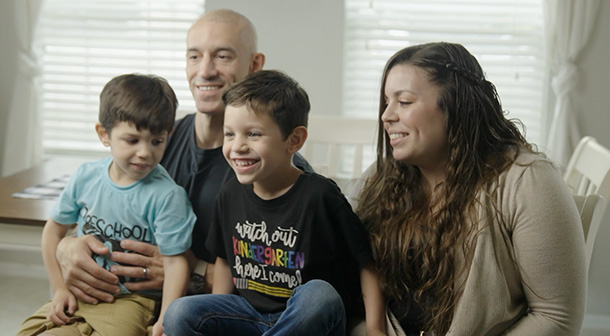
The Rivera family shares how much they appreciate Ms. Jackson.
The Power of Strong Support
The Rivera family is very grateful for the impact that Ms. Jackson has had on their lives. “We live off base, and I don’t have contact with many other military spouses,” Kayla says. “She kind of was our village. She didn’t treat us like we were just another client, so I’m very attached to her just like she is for our family. She knew what was good for us before we knew what was good for us!” And Ms. Jackson clearly feels the same. “I want to keep that going,” she says, “I don’t want them to think they’re in session with me for 10 sessions and goodbye. I’m in this with them no matter where I’m at.”
Finding Programs Near You
The SMVF program is currently available in Bell, Bexar, Coryell, El Paso, Harris, Kleberg, Lampasas, McLennan, Montgomery, Nueces, Waller, and Williamson. To qualify for this child and family service, families must live in the specified service delivery area county or combined service area. Because the program is offered through local community partners, availability, eligibility, and resources vary by county. Find programs in your area.



